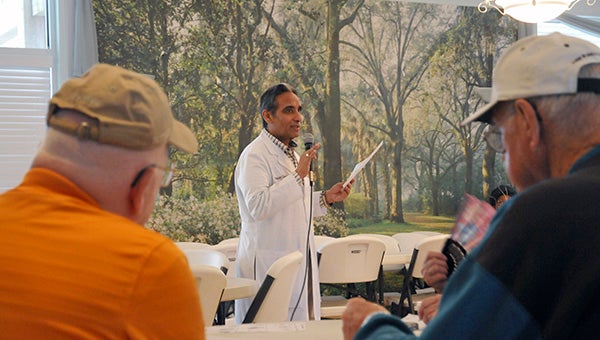Chawla visits seniors to discuss ways to avoid sleeping disorders without medicine
Published 7:00 am Tuesday, February 28, 2017

Dr. Anwant Chawla, MD, ABSM, visited the Senior Center of South Pearl River County to discuss ways to avoid sleeping disorders in the later years of life.
Photo by Taylor Welsh
On average, people spend roughly one-third of their life sleeping, but still, little is known about sleep and what impact it has, especially later in life.
Anwant Chawla, medical director of The Grove at Highland Community Hospital, visited the Senior Center of South Pearl River County to discuss how to get a good night’s sleep without medicine, through different practices of proper sleep habits.
Chawla has spent over 30 years in the psychiatry field and discovered 12 ways to get better sleep without medicine, he said.
There are three parts that he covers with each patient. The first is to change the way someone thinks utilizing different psychological practices like counseling, which can change negative thoughts into positive ones. The second involves the social network of the individual.
“If someone does not have a good, uplifting social life, it can affect your mood, which in a depression state, can greatly affect one’s sleeping habits,” he said.
Lastly, Chawla said that he writes prescriptions only when necessary, describing how harmful sleeping pills can be to the user’s health.
“Once people start taking sleeping pills, they begin to rely on them more and more,” he said. “That is called addiction. Also, every medicine has a side effect, and those of sleeping pills could be causing harm to your liver or other parts of your body. You don’t need sleeping pills to get a good night’s rest.”
Chawla said he advises patients who take prescribed medicines to “start low and go slow” with the dose.
In older adults, it is fairly common to have some type of sleep disorder, the most common being insomnia, Chawla said. To counter sleep disorders, Chawla suggested sticking to a regular sleep schedule in order to “fix your biological clock inside your brain so your body knows when it is time to go to bed and when it is time to wake up,” Chawla said.
This is why people are more tired on Monday than any other day of the week, he said, adding that there are more motor vehicle accidents on Monday mornings than any other day of the week.
Exercising regularly is another path to quality sleep. However, Chawla said exercising should not be done right before bed time. For the best results, he suggested working out early in the morning or early afternoon.
“The more tired you are, the better sleep you will get,” he said.
Getting too much sleep is just as harmful as too little, he said. Chawla said he suggests 6-8 hours of sleep each night. However, one of the most common practices people with sleeping disorders partake in is drinking caffeinated or alcoholic drinks after 4:00 p.m.
“I am from India, so I know that tea is a very common drink to have after dinner or something like that. Tea has less caffeine than coffee. In fact, one cup of coffee has as much caffeine as three cups of tea. Also, one can of beer takes one hour to be digested; so if you had three beers to drink one night, give yourself three hours before you go to bed,” he said.
Chawla suggested a quiet bedroom, including one free from snoring.
Even though a person is snoring, oxygen is still reaching the lungs and brain. However, when someone stops snoring, oxygen is not going into the lungs, which can be fatal, he said. This disorder is called sleep apnea. While dreaming, the body cannot regulate temperature. During that state, the outside temperature becomes the body’s inside temperature.
“If you are sleeping in 31 degree weather, that person might not die if they are not dreaming, but once he goes into the dream sleep, that person’s body temperature will eventually get to 31 degrees and die,” he said.
For more information on sleep disorders, call Chawla at 601-358-9881.




